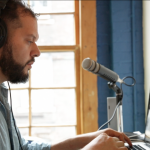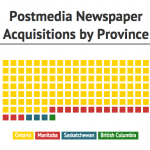The Quebecor empire, on which the son refuses to set
Don’t panic.
Image via Maclean’s.
Or, okay, go ahead and panic. Whatever.
In case you’ve been living under a rock or haven’t checked your Vidéotron email: Pierre Karl Péladeau (or PKP), who served as CEO of self-styled “communications giant” Quebecor from 1999-2013, and vice-chair thereafter, is running for the Parti Québécois in the upcoming provincial election.
Realizing that it could be a wee conflict of interest to be a cabinet minister and vice-chair of a communications giant, Péladeau announced that he was resigning from his post on the board of directors, which is great.
He also told reporters that he had no intention to sell his shares in Quebecor, which CBC reported represent a 28 percent stake of Quebecor, Inc. and a majority stake in subsidiary Quebecor Media’s voting rights. Quebecor Media owns, among other properties, the Journal de Montréal, the nation-wide chain of Sunnewspapers, and broadcaster TVA.
One might call this problematic (if one wanted to understate the situation), and a possible violation of the legislature’s ethics code, if that’s the kind of thing one chooses to careabout.
PKP’s initial admission that he’d defy the ethics commissioner if he were told to divest Quebecor is a truly amazing unforced error.
— Andrew Coyne (@acoyne) March 11, 2014
It is one thing to have meddlesome owners sticking their noses into newsrooms for political purposes (Mr. Asper on line one), but quite another to have a meddlesome owner sticking his nose into newsrooms for both political purposes and personal advancement. As editor-turned-senator Joan Fraser told The Canadian Press*, “When you cross the line and become both a legislator and the proprietor of very powerful media voices, I think the situation becomes significantly more troublesome.”
Proving an owner’s hand in a newspaper or broadcaster’s editorial operations can be difficult, but for Péladeau, it is at least a problem of perception. In 2010, according to a survey** for the chaire de recherche en éthique du journalisme at the University of Ottawa, 50 percent of Quebec respondents thought that PKP’s corporation was the most likely media company to use its publications to advance its directors’ political and economic agendas. That number was effectively unchanged in another survey the next year.
Last year, Martin Patriquin of Maclean’s presented a few disturbing accusations of interference and agenda-setting by PKP, including at its newspapers. (For what it’s worth, Quebecor denied it all, and the Sun papers—Péladeau’s English-language fiefdom—say he’s a hands-off kind of guy.)
These are unfamiliar, if not necessarily uncharted, waters. Even the closest comparison isn’t close enough to be instructive: Michael Bloomberg, whose ownership of Bloomberg LP made him richer than Yemen, was not known for editorial interference before his three terms as mayor of New York City, and has only gotten his hands dirty since leaving office.
Concerns over editorial independence, particularly in communications giants like Quebecor, are not new in Canada. In 1981, the Kent Commission recommended legislation that “would raise the status and enhance the freedom of journalists by protecting their rights, if a newspaper is under an ownership that has major interests outside the newspaper, and provide an opportunity for the voice of the community, whose citizens have a particular stake in the quality of the local newspaper, to be heard.”
The commissioners may have meant major pecuniary interests (perhaps in forestry and shipbuilding), but surely a seat at the cabinet table counts as more than a minor interest.
*CP is 1/3-owned by Square Victoria Communications Group, which publishes La Presse and is a subsidiary of Power Corp., which was featured on the cover of Wednesday’s Quebecor-owned Journal de Montréal. La Presse put Péladeau on its cover.
**The 2010 poll was conducted via telephone by Écho Sondage, and surveyed 1,005 Quebeckers, aged 18 or older. It had a margin of error of +/- 3.1 percent, 19 times out of 20, and a response rate of 30.7 percent. The wording of the questions and responses can be found (in French) in CREJ’s report; the question about a media outlet’s economic or political agenda is on page nine. For insight into how journalists feel about ownership concentration, see page eight of this 2012 report from CREJ.
Remember to follow the Review and its masthead on Twitter. Email the blog editor here.














